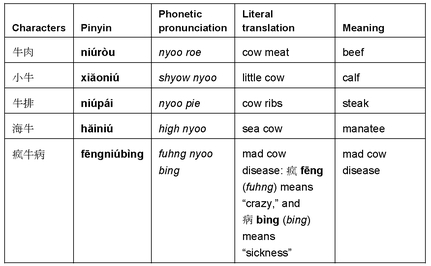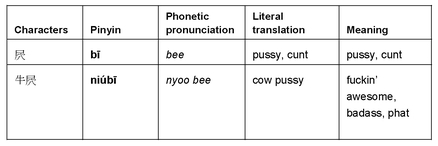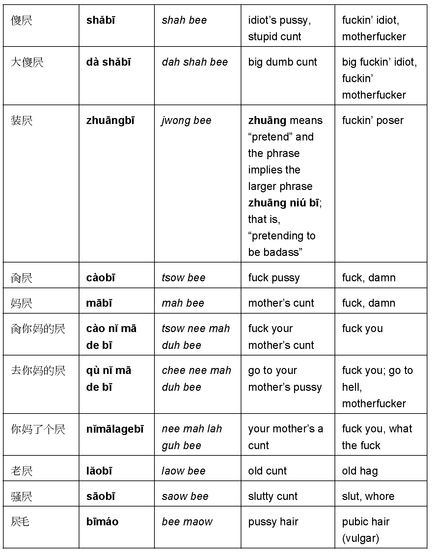Niubi! (3 page)
Authors: Eveline Chao

Thanks to the modularity of Chinese, a word like
niúbī
can be thought of as being constructed of two building blocks (“cow” and “pussy”) that can be taken apart and combined with other building blocks to make new (and often impressively logical) words. Thus on the “cow” side, we have words like:
niúbī
can be thought of as being constructed of two building blocks (“cow” and “pussy”) that can be taken apart and combined with other building blocks to make new (and often impressively logical) words. Thus on the “cow” side, we have words like:

And on the “pussy” side? This is where things get fun. For your convenience, below is a handy table—a cunt chart, if you will—of some of the many dirty words that use
bī
:
bī
:


CHAPTER TWO
The Chinese Art of Everyday Abuse
O
ne of the first words you’ll learn in Chinese class is 你好
nĭhǎo
(
nee how
), which means “hello.” However, the fact is that Chinese people don’t actually say
nĭhǎo
all that often. Instead, when you arrive for dinner, a party, or a meeting, they’ll say, “You’ve arrived,” 你来了
nǐ lái le
(
nee lie luh
). When you depart, someone will say, “You’re going,” 你走啦
nǐ zǒu la
(
nee dzoe lah
).
ne of the first words you’ll learn in Chinese class is 你好
nĭhǎo
(
nee how
), which means “hello.” However, the fact is that Chinese people don’t actually say
nĭhǎo
all that often. Instead, when you arrive for dinner, a party, or a meeting, they’ll say, “You’ve arrived,” 你来了
nǐ lái le
(
nee lie luh
). When you depart, someone will say, “You’re going,” 你走啦
nǐ zǒu la
(
nee dzoe lah
).
When I walk down the street on a windy day, it seems the conversation is the same for everyone I pass. The granny taking her granddaughter out for a stroll will exclaim, as she lifts the little girl into her stroller, “It’s windy!” The two middle-aged men running into each other on the street will greet each other by saying, “So windy today!” When I get home, the trash collector sitting on my stoop will welcome me back by announcing, “What a windy day!”
Chinese people love to comment on the obvious, sometimes to the point of insensitivity or what we might even consider outright cruelty. Chinese sports commentators often say things like “Wow, he’s gained a lot of weight!” about athletes on the field. I have a “big-boned” older cousin whom, for as far back as I can remember, we have always called 胖姐姐
pàng jiějie
(
pahng jyih jyih
), which literally means “fat sister.” Westerners in China were once referred to as Big Nose. President Obama is often referred to as 黑人
hēirén
(
hay ren
), or “the black guy.” My bearded friend Jason is referred to as Big Beard. My mother is called the Mandarin equivalent of American Auntie, her older sister is Eldest Aunt, and my father is Old Man. It’s as if every Chinese person is somehow living in gangland Chicago or some imaginary criminal underworld in which everyone needs a self-descriptive nickname to make it easier for the FBI to identify them. Indeed, the most notorious gang boss in Chinese history was “Big-Eared” Du, and his mentor was “Pockmarked” Huang.
pàng jiějie
(
pahng jyih jyih
), which literally means “fat sister.” Westerners in China were once referred to as Big Nose. President Obama is often referred to as 黑人
hēirén
(
hay ren
), or “the black guy.” My bearded friend Jason is referred to as Big Beard. My mother is called the Mandarin equivalent of American Auntie, her older sister is Eldest Aunt, and my father is Old Man. It’s as if every Chinese person is somehow living in gangland Chicago or some imaginary criminal underworld in which everyone needs a self-descriptive nickname to make it easier for the FBI to identify them. Indeed, the most notorious gang boss in Chinese history was “Big-Eared” Du, and his mentor was “Pockmarked” Huang.
And as if that wasn’t bad enough, Chinese people, perhaps as a result of their collective thick skin, tend to demonstrate affection by being mean. Or rather, they speak frankly to each other in a way that, for them, indicates a level of familiarity that only a close relationship can have. But, to outside observers, it resembles, at best, a sort of constant, low-level stream of verbal abuse. For a young Chinese woman, there is no better way to express love for her boyfriend than by whacking him with her purse while telling him he’s horrible. Groups of friends incessantly interrupt each other with cries of “Nonsense!” or “Shut up!” A good way to greet a pal is to give him a pained look and ask what the hell he did to his hair. I myself have had many an otherwise peaceful afternoon spent curled up on an armchair, happily reading a book, when I’ve been suddenly interrupted by a passing aunt or some other stray family member who snuck up behind me, smacked me across the back, and bellowed, “哎呀!, 蠢! ” “
iyā! Yòu féi, yòu chǔn!
” (
aye yah! yo fay, yo chren!
): “My God! So fat and lazy!”
iyā! Yòu féi, yòu chǔn!
” (
aye yah! yo fay, yo chren!
): “My God! So fat and lazy!”
The Chinese word for “scold” or “verbally abuse” is 骂
mà
(
mah
). Note those two squares at the top of the character—they represent two mouths, no doubt heaping abuse on the nearest person available. This chapter gathers words for the age-old art of 骂人
màrén
(
mah ren
) or “scolding people,” including everyday exclamations of annoyance and frustration, teasing put-downs and dismissals, words for affectionate name-calling, everyday insults, and everything else you’ll need to generally convey to the most important people in your life that their very existence on this earth is a constant and overwhelming burden.
mà
(
mah
). Note those two squares at the top of the character—they represent two mouths, no doubt heaping abuse on the nearest person available. This chapter gathers words for the age-old art of 骂人
màrén
(
mah ren
) or “scolding people,” including everyday exclamations of annoyance and frustration, teasing put-downs and dismissals, words for affectionate name-calling, everyday insults, and everything else you’ll need to generally convey to the most important people in your life that their very existence on this earth is a constant and overwhelming burden.
And finally, the Chinese may have a healthy sense of humor when it comes to the slings and arrows of everyday life, but they can also hold a grudge, and so at the end of the chapter you’ll find words to fuel the fire when things cross the line into full-on feuding—genuinely venomous insults with the power to end decades-long friendships, provoke fistfights, and possibly get you disowned.
Everyday exclamations哎呀
àiya
(
aye yah
)
àiya
(
aye yah
)
A common interjection that can be used for a wide range of occasions: when you’ve forgotten something, when you’re impatient, when you’re bored, when you feel helpless, as a lead-in to scolding someone, etc. It isn’t exactly a word—more like a weighty sigh and roughly equivalent to “Oh Lord!” or “My God!”
糟了
zāole
(
dzow luh
—the starting sound in
dzow
is like a buzzing
bzz
sound but with a
d
instead of a
b
, and the whole syllable should rhyme with “cow”)
zāole
(
dzow luh
—the starting sound in
dzow
is like a buzzing
bzz
sound but with a
d
instead of a
b
, and the whole syllable should rhyme with “cow”)
A very common expression of dismay. Literally “rotten” or “spoiled” and something like saying, “Oh shoot!” “Darn!” or “Crap!” You can also say 糟糕
zāogāo
(
dzow gaow
—both syllables rhyme with “cow”), which literally means “rotten cakes,” but it’s less current.
zāogāo
(
dzow gaow
—both syllables rhyme with “cow”), which literally means “rotten cakes,” but it’s less current.
完了
wánle
(
wahn luh
)
wánle
(
wahn luh
)
Same meaning as
zāole
(above). It’s pretty much like exclaiming “Crap!” to yourself. Literally, it means “over.”
zāole
(above). It’s pretty much like exclaiming “Crap!” to yourself. Literally, it means “over.”
老天爷
lǎotiānyé
(
laow tyinn yeh
)
lǎotiānyé
(
laow tyinn yeh
)
Literally “my father God” and sometimes 我的天
wǒdetiān
(
wuh duh tyinn
), literally “my heavens.” Equivalent to exclaiming “My God!” or “Oh goodness!” These phrasings are more common among older people; younger people usually shorten them to 天哪
tiānnǎ
(
tyinn nah
) or simply 天
tiān
(
tyinn
): “Oh heavens!” or “Heavens!”
wǒdetiān
(
wuh duh tyinn
), literally “my heavens.” Equivalent to exclaiming “My God!” or “Oh goodness!” These phrasings are more common among older people; younger people usually shorten them to 天哪
tiānnǎ
(
tyinn nah
) or simply 天
tiān
(
tyinn
): “Oh heavens!” or “Heavens!”
哇塞
wā sài
(
wah sigh
)
wā sài
(
wah sigh
)
Shoot! Darn! Oh my God! Wow! Holy cow! An exclamation especially popular among girls. Comes from a Taiwanese curse that means “Fuck your mother” (but is a shortened and nonprofane version of it).
该死的
gāisǐde
(
guy sih duh
)
gāisǐde
(
guy sih duh
)
My God! Holy crap! Literally “should die.”
气死我了
qìsǐwǒle
(
chee sih wuh luh
)
qìsǐwǒle
(
chee sih wuh luh
)
Argh! Damn it! Crap! Literally, “I’m angry to the point of death.”
可恶
kěwù
(
kuh woo
)
kěwù
(
kuh woo
)
Literally “hateful” and said alone means something like “Darn!”
傻眼
shǎyǎn
(
shah yen
)
shǎyǎn
(
shah yen
)
Oh no! Said in response to surprising, negative situations. For example, if you discover that your house has been broken into. Literally “dumbfounded eye.”
晕
yūn
(
een
)
yūn
(
een
)
Means “dizzy” or “faint” and is often uttered to express surprise, shock, amusement, or even confusion or disgust; that is, emotions that might make you feel faint.
倒霉
dǎoméi
(
dow may
)
dǎoméi
(
dow may
)
Bad luck. You can say this when something unfortunate happens. This sentiment can be made slightly stronger by saying 真倒霉
zhēn dǎoméi
(
jen dow may
), which means “really bad luck.”
zhēn dǎoméi
(
jen dow may
), which means “really bad luck.”
点儿背
diǎnr bēi
(
dyerr bay
)
diǎnr bēi
(
dyerr bay
)
Beijing/northern Chinese slang for
dǎoméi
(above), used the same way. Literally “fate turns its back on you.” 点儿
Diǎnr
is northern Chinese slang for “luck” or “fate,” and 背
bēi
means “back.”
dǎoméi
(above), used the same way. Literally “fate turns its back on you.” 点儿
Diǎnr
is northern Chinese slang for “luck” or “fate,” and 背
bēi
means “back.”
残念
cánniàn
(
tsahn nyinn
)
cánniàn
(
tsahn nyinn
)
Bummer, too bad. Popular among young people to express disappointment. Derived from the Japanese phrase
zannen desu
, which sounds similar and means something like “what a shame” or “that’s too bad.”
zannen desu
, which sounds similar and means something like “what a shame” or “that’s too bad.”
郁闷
yùmēn
(
ee men
)
yùmēn
(
ee men
)
A popular term among young people, it means “depressed” but is used as an adjective for a much larger range of situations—when they feel pissed off, upset, disappointed, or even just bored. Exclaimed alone, one would say, “郁闷啊. . .” “
Yùmēn ā
. . .” (
ee men ah
), meaning “I’m depressed . . .” or “Sigh . . .”
Dismissals and shutdownsYùmēn ā
. . .” (
ee men ah
), meaning “I’m depressed . . .” or “Sigh . . .”
没劲
méijìn
(
may jeen
)
méijìn
(
may jeen
)
Literally “no strength.” Said dismissively of things you find uninteresting or stupid, much like saying “whatever.” A stronger way to say this is 真没劲
zhēn méijìn
(
jen may jeen
), literally “really no strength.”
zhēn méijìn
(
jen may jeen
), literally “really no strength.”
无聊
wúliáo
(
ooh lyow
)
wúliáo
(
ooh lyow
)
Nonsense, bored, boring. A common expression if you’re bored is 无聊死了
wúliáo sǐ le
(
ooh lyow sih luh
), literally “bored to death.” You can also say
wúliáo
in response to something you find stupid or uninteresting; for example, in response to an unfunny joke.
wúliáo sǐ le
(
ooh lyow sih luh
), literally “bored to death.” You can also say
wúliáo
in response to something you find stupid or uninteresting; for example, in response to an unfunny joke.
服了
fú le
(
foo luh
) or 服了你了
fúle nǐ le
(
foo luh nee luh
)
fú le
(
foo luh
) or 服了你了
fúle nǐ le
(
foo luh nee luh
)
Literally means “admire you” and sometimes said genuinely in response to something awe inspiring, but more usually said mockingly when someone says or does something silly or stupid. A more common form among younger people is “I 服了 U!” or “I
fú le
you,” literally “I admire you,” from a 1994 Stephen Chow movie.
fú le
you,” literally “I admire you,” from a 1994 Stephen Chow movie.
不想耳食你
bùxiǎngěrshínǐ
(
boo shahng er shih nee
)
bùxiǎngěrshínǐ
(
boo shahng er shih nee
)
I don’t even want to talk to you; I’m ignoring you. Literally, “I don’t want to ear eat you.” Originally Sichuan slang.
帮帮忙
bāngbāngmáng
(
bahng bahng mahng
)
bāngbāngmáng
(
bahng bahng mahng
)
Literally means “help” but used in Shanghai to admonish someone before rebutting something they’ve said. The equivalent of sarcastically saying “come on” or “please” or “give me a break.”
小样了吧
xiǎo yàng le ba
(
shyaow yahng luh bah
)
xiǎo yàng le ba
(
shyaow yahng luh bah
)
Said when laughing at or mocking someone else. Similar to “ha-ha” or “suck that.” Used in northeastern China. Literally something like “(look at) that little face!”
哑了啊?
yǎ le a?
(
yah luh ah
)
yǎ le a?
(
yah luh ah
)
Literally, “Are you mute?” 哑
Yǎ
means “dumb” or “mute.” You can ask this when you say something and don’t get a response.
Yǎ
means “dumb” or “mute.” You can ask this when you say something and don’t get a response.
Other books
The Broken Eye by Brent Weeks
Lady Alexandra's Lover by Helen Hardt
Blackout by Chris Ryan
Identity Crisis (Rocky Mountain Novella Series) by Chambers, Rory
The Mirage by Naguib Mahfouz
How To Choose a Sweetheart by Nigel Bird
A Thousand Ways to Please a Husband With Bettina's Best Recipes by Louise Bennett Weaver, Helen Cowles Lecron, Maggie Mack
Unlawful Seizure (Filthy Florida Alphas Book 1) by Rose, Baylee
Nicole Kidman: A Kind of Life by James L. Dickerson
Highlander’s Curse by Melissa Mayhue
